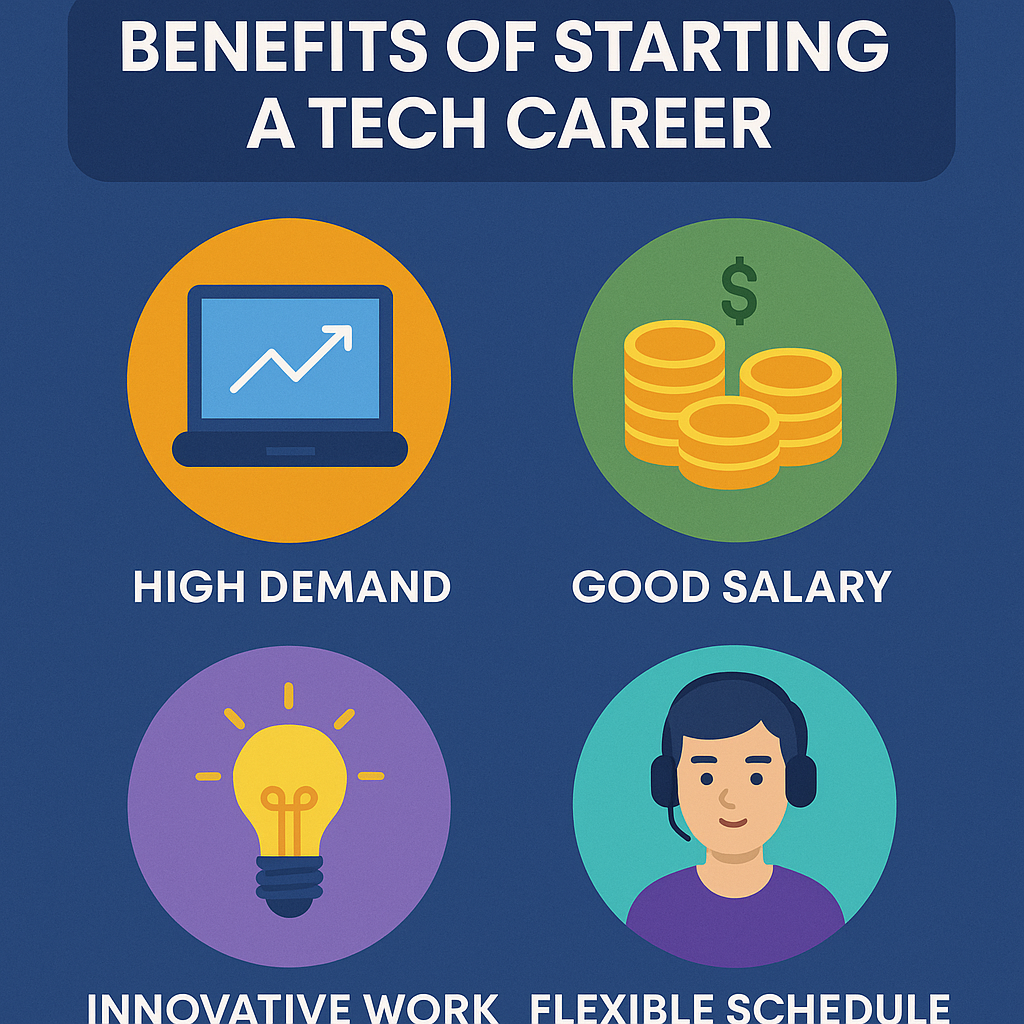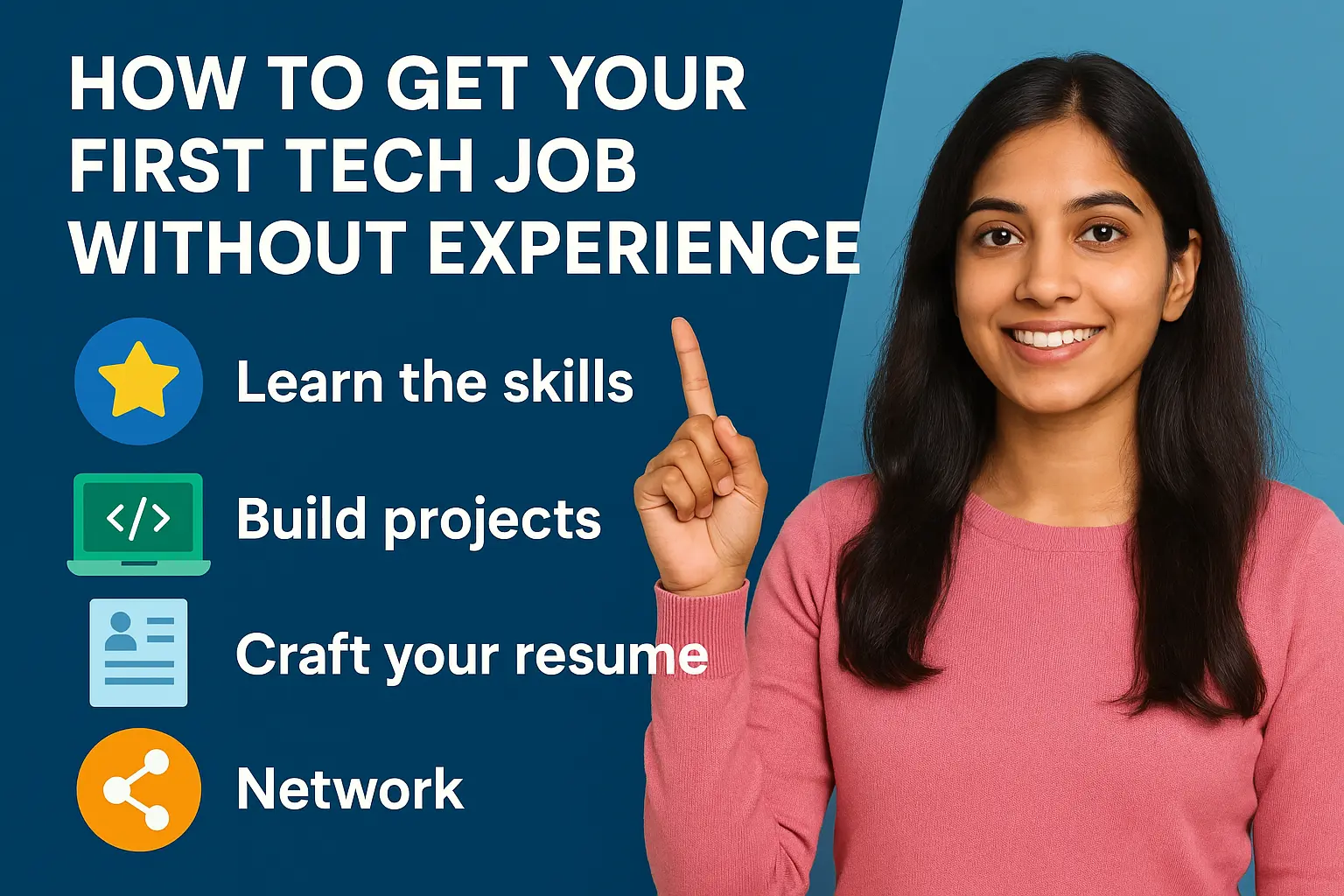Starting your first tech job without any experience can feel daunting. You might worry that all tech roles require degrees or years of training. The good news is that entry-level tech jobs do exist for beginners. Contrary to common fears, it’s not true that you need years of experience or a degree to get started in tech. Remember, an entry-level position is simply the access point into a fulfilling career path. While the process may be challenging, keep pushing forward. As one developer puts it, once you land that first tech job, “the world basically opens up for you”.
Tech Job Market and Entry-Level Roles
The tech industry is booming, and employers need new talent. IT and computer jobs are expected to grow much faster than the average of all occupations. In fact, analysts predict around 6% annual growth in tech jobs through the 2020s. This positive outlook means plenty of opportunities for beginners. Common entry-level roles include:
- Help Desk / IT Support: Assisting users with computer problems. Many pros start here and learn hands-on troubleshooting.
- Junior Web Developer: Building and maintaining websites. This role is in demand, with about 8% growth.
- Quality Assurance (QA) Tester: Testing software for bugs and helping ensure quality.
- Data Analyst (Junior): Working with data and tools (like Excel or Python) to support business decisions.
- Others: Roles like UX/UI designer, cybersecurity specialist, and digital marketer can also be entry points.
Challenges and Mindset
Breaking into tech can feel tough at first, but the right mindset is key. Remember that companies often see a brand-new applicant as a risk if you have no experience. To lower that risk, prove you have basic skills: build simple apps or personal projects and share them publicly (for example, on GitHub). This shows employers you already have a foundation to build on. Also treat your job search as a numbers game — apply to many openings and keep learning between interviews. As one industry mentor puts it, finding that first tech role “may be one of the hardest things,” but with persistence, “it is doable”.
Methods to Get Your First Tech Job
There are many practical ways to improve your chances of landing a tech job without experience:
- Self-Learning and Online Courses: Take advantage of free or low-cost tutorials. Sites like Codecademy, freeCodeCamp, and Coursera offer interactive lessons on programming and IT skills.
- Certificates and Bootcamps: Earn industry certificates (e.g., Google IT Support Professional Certificate, CompTIA A+, AWS) or join a coding bootcamp. Certifications show employers you have specific skills.
- Internships and Volunteering: Look for internships or volunteer roles, even unpaid ones. Helping out a nonprofit or small business with tech tasks can give you real-world experience.
- Build Personal Projects: Create your own apps, websites or data projects. A portfolio of projects serves as proof of your abilities. Share your code on GitHub so recruiters can see your work.
- Networking: Connect with tech professionals on LinkedIn and join local tech meetups or Meetup groups. Networking can lead to job referrals and advice.
- Freelancing and Gig Work: Try freelance platforms like Upwork or Fiverr for small coding gigs. Freelancing not only earns some money but also builds experience and confidence.
Benefits of Starting a Tech Career

Tech careers offer many perks. They generally pay very well U.S. tech workers earn about $104,000 per year on average. The industry is growing fast, so you’ll have job security and advancement; tech roles are expanding twice as quickly as the overall job market. Many tech jobs also offer flexible work options (like remote schedules) and a good work-life balance. Overall, a tech career can mean steady income, skill growth, and chances to work on exciting or innovative projects.
Practical Applications of Tech Skills
Tech skills let you solve real-world problems across many fields. For example, you might build a mobile app or website that simplifies someone’s daily tasks, or use data analysis to help a business make smarter decisions. Even routine work like setting up computers or fixing software issues directly helps people do their jobs. As one tech guide notes, your knowledge in tech will “make other people’s lives simpler”. Plus, tech roles exist in every industry – from healthcare to education to entertainment – meaning your skills can be applied almost anywhere.
FAQs
- Do I need a college degree or prior experience to get a tech job?
No. Many tech workers are self-taught or career-changers. Employers often care more about what you can do (your skills and projects) than your diploma. Focus on learning and showing your abilities. - What tech skills should I learn first?
Start with the basics. If you’re interested in web development, learn HTML, CSS, and JavaScript. For general programming or data work, try Python or another beginner-friendly language. Also learn basic computer skills like using Git or database tools. - How can I make my resume stand out with no experience?
Build a portfolio of personal projects or contributions. Create small websites, apps, or code samples and share them (for example, on GitHub). These projects show employers your practical skills. You can also list any relevant certificates, internships, or volunteer work. - Are certifications or bootcamps worth it?
They can help. Earning tech certificates (like Google IT Support, CompTIA A+, AWS) or attending a coding bootcamp gives you concrete skills and something to show on your resume. Just remember, certificates are most powerful when paired with real projects and practice.
Conclusion
Getting your first tech job without experience takes time and effort, but it’s definitely possible. Remember that the tech industry is booming and entry-level positions are there for those who seek them. Keep learning new skills, building projects, and making connections. Stay persistent and keep applying. As one mentor notes, once you land that first job, you will have “closed that gap from no experience to some experience, and that’s huge”. In other words: keep going – the first step will open up many more opportunities.









Cision Off Campus | Software Engineer | Freshers | Remote -
[…] to boost your chances even more? 👉 Check out this guide on How to Get Your First Tech Job Without Experience – it’ll walk you through resume tips, skills to focus on, and interview preparation tricks that […]